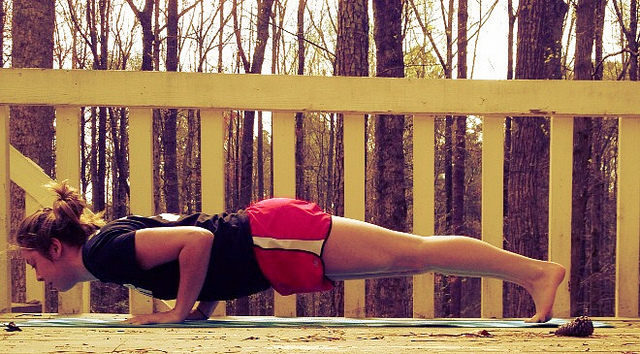“The world would be a better place if everyone did yoga.”
Those words of wisdom came from my teenage yoga student, Mel.
She has been in my school classroom (I’m a Spanish teacher by day) since the third grade and I’ve seen her grow over the past few years.
Mel is now 13 years old, and I have never seen as beautiful a transformation in any kid as I have over the few months since she began her yoga practice.
She carries a grace and confidence about her, recognizes her triumphs and takes her shortcomings in stride. She knows her own beauty, inside and out. Most importantly, she says she is proud of herself.
I have often wondered how my adolescence would have been different if I had discovered yoga earlier.
I not only teach yoga, but also have the privilege to teach middle school teens. Most people say that it must be a difficult age and that I’m crazy. However, I find it highly rewarding to see them become adults.
The teenage years exude change in the highest degree and we adults often think back to the challenges we faced—social awkwardness and all. Yes, that still exists, but today’s teenagers have many more distractions than previous generations and have developed a pressure for perfection.
But yoga can help. Here are four reasons teenagers (and anyone) should practice yoga.
1. Yoga helps teens to relax and disconnect.
My teenage students have packed schedules and the concept of meaningful relaxation is foreign to them. After school, many of my students play sports either in school or out of school and on top that have at least two hours of work nightly.
Downtime usually involves a screen in our digital age, so relaxation to a teen might involve watching Netflix, perusing social media, playing video games, or, a non-screen alternative, reading a book assigned for literature class.
In yoga, we can find a moving meditation, challenging our muscles, connecting with our breath, and ultimately finding stillness in savasana (relaxation pose). Yoga invites us to find true relaxation and unwind from our day with a healthy activity. We make time to reboot our system, and ultimately work better without the mind clutter.
Teens who practice yoga can leave class feeling peaceful and rejuvenated—ready to take on tasks ahead of them.
2. Yoga helps at a time when mental health problems are common.
Between the busy schedules and social pressures associated with the age, one in five children will be affected by a mental health disorder before reaching adulthood, the most common being anxiety, depression and ADHD. Shockingly, 60 percent of children with diagnosable depression are not treated. Kids with anxiety disorders are treated even less, with 80 percent not receiving treatment.
Many yoga instructors use themes and quotes to encourage mindfulness during the practice. Various studies cite measured benefits of meditation to help regulate mood and anxiety disorders, manage ADHD, reduce stress, and improve focus, amongst many others.
Meditation is shown to be a non-medicinal alternative to treat mood and attention disorders, for teens and adults.
3. Yoga encourages a non-competitive atmosphere.
On their report cards, on the fields, and in social environments, teens face judgment and competition everywhere. Rarely do they have an outlet to be purely recognized for their efforts, without measurement. Additionally, this current generation has developed a fear of failure, and thus, wants to win every game, get the highest grade possible, and be the most popular kid in the school.
Yoga encourages non-attachment and non-judgment. One day my students may do a pose and the next day struggle, but I encourage my students to not attach their self-worth to a specific outcome. Everyone is at a different level with their yoga (and life) experience and we cannot judge ourselves, better or worse, than each other.
There is no score in yoga. Teens can hit the pause button on self-judgement and simply be content with their effort.
4. Yoga can help to increase self-esteem and body acceptance.
As teens physically become adults, they frequently struggle with body image issues. Teens are highly impressionable. Combine that with hurtful comments, critique, and distorted social media “ideals” and you have a recipe for low self-esteem. The way they view their bodies is undeniably linked to their own self-esteem.
The negativity, self-imposed or external, can lead to dangerous eating disorders or crippling depression. Teens are adjusting to new physical proportions, dealing with negativity, and learning how to be confident.
Yoga embraces confidence through diversity. Teens can recognize that our bodies are perfect regardless of shape, color or size.
At the end of every yoga class, I ask my students to do two things: thank their bodies for all the wonderful things it does and to give themselves three compliments. We focus on a healthy self image, body and mind. We can choose to be our own best friends or our worst enemies by the way we view ourselves.
So teens, take some advice from your fellow teenage spokes-yogi, Mel, and get on your mat!
~
Relephant read:
Help! There’s a Teenager in my Yoga Class.
~
Author: Kelsie Strunc
Editor: Khara-Jade Warren
Image: Jillian/ Flickr
~







Read 2 comments and reply